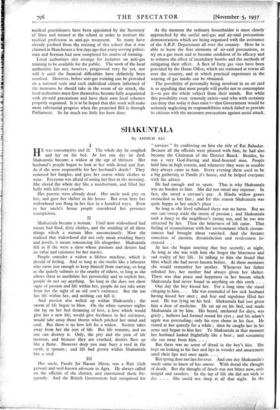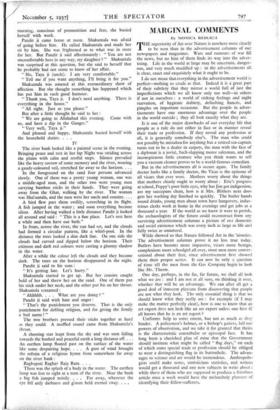SHAKUNTALA
By AHMED ALI
I
HE was consumptive and ill. The whole day he coughed and lay on his bed. At last one day he died. Shakuntala became a widow at the age of thirteen. Her husband's people began to look at her with dread and fear. As if she were responsible for her husband's death ! They removed her bangles, and gave her coarse white clothes to wear. Everyone was afraid of seeing her face in the morning. She slaved the whole day like a maidservant, and filled her belly with left-over crumbs.
Her parents were already dead. Her uncle took pity on her, and gave her shelter in his house. But even here her widowhood was flung in her face in a hundred ways. Even in her uncle's house people considered her presence inauspicious.
II
Shakuntala became a woman. Until now widowhood had meant bad food, dirty clothes, and the avoiding Of all those things which a woman likes unconsciously. Now she realised that widowhood did not only mean avoiding finery and jewels, it meant renouncing life altogether. Shakuntala felt as if she were a slave whose passions and desires had no value and existence for her master.
People consider a widow a lifeless machine, which is devoid of feeling. And so long as she works like a labourer who earns just enough to keep himself from starving, so long as she quietly submits to the cruelty of others, so long as she allows them to annihilate her personality and to exploit her, people do not say anything. So long as she does not show signs of passion and life within her, people do not take away from her the right of an old cow's existence. But she too has life within her, and nothing can kill it.
And passion also welled up within Shakuntala ; the storm of life began to blow. On the white summer nights she lay on her bed dreaming of love, a love which would give her a new life, would give freshness to her existence, would take away those thorns which pricked her mind and soul. But there is no love left for a widow. Society takes away from her the joys of life. But life remains, and no one can destroy it. Only, the pity and the pain of life increase, and because they are 'crushed, desires flare up like a flame. However deep you may bury a seed in the earth, it sprouts ; and life had grown within Shakuntala like a seed.
III
Her uncle, Pandit Jai Narain Misra, was a Rais (rich person) and well-known advocate in Agra. He always called on the officials of the district, and entertained them fre- quently. And the British Government had recognised his " services " by conferring on him the title of Rai Bahadur. Because all the officials were pleased with him, he had also become the Chairman of the District Board. Besides, he was a very God-fearing and kind-hearted man. People held him in high esteem, and whenever they were in trouble they always came to him. Every evening there used to be a big gathering at Pandit ji's house, and he helped everyone with his advice.
He had enough and to spare. That is why Shakuntala was no burden to him. She did not entail any expense: In fact, she saved a servant's pay. A Hindu widow grows reconciled to her fate ; and for this reason Shakuntala was quite happy at her uncle's place . . .
So long as she lived subdued there was no harm. But no one can sweep aside the storm of passion ; and Shakuniala took a fancy to the neighbour's young son, and he too was attracted by her. Then the bitterness of life came. That feeling of reconciliation with her environment which circum- stances had brought about vanished. And she became conscious of passion, dissatisfaction and restlessness in- creased . . .
At last she began meeting that boy secretly, at night. As long as she was with him she forgot the bitterness and sad reality of her life. In talking to him she found 'that bliss which she had never known before. At these moments she would remember her mother. Whenever her father rebuked her, her mother had always given her shelter. There was that peace and happiness in her bosom which Shakuntala had never found in anything on this earth . . .
One day the boy kissed her. For a long time she stood clinging to him. . . . She was reminded of her sick husband having kissed her once ; and fear and repulsion filled her soul. He was lying on his bed. Shakuntala had just given him a dose of medicine. He sat up on his bed, and made Shakuntala sit by him. His beard, unshaved for days, was grisly ; hollows had formed round his eyes ; and his adam's apple was protruding; only his eyes shone in his face. He stared at her queerly for a while ; then he caught her in his arms and began to kiss her. To Shakuntala at that moment her husband looked frightfully like a bear ; and screaming she ran away from him. . . .
But there was no sense of dread in the boy's kiss. She kept on looking at his face and lips in wonder and amazement until their lips met once again. . . .
But spring does not last for ever. And one day Shakuntala's uncle came to know of her amour. With dread she thought of death. But the thought of death was not bitter now, only insipid and tasteless. ' In the lap of life she did not wish to die. . . . She 'could not sleep at all that night. In the morning, conscious of premonition and fear, she busied herself with work.
Pandit ji came home at noon. Shakuntala .was afraid of going before him. He called Shaktuttala and made her sit by him. She was frightened as to what was in store for her. But Pandit ji said affectionately : " You are not uncomfortable here in any way, my daughter ? " Shakuntala was surprised at this question, but she said to herself that he probably had not come to know of her affair.
" No, Taya ji (uncle). I am very comfortable."
" Tell me if you want anything, I'll bring it for you."
Shakuntala was amazed at this extraordinary show of affection. But she thought something has happened which has put him in such good humour.
" Thank you, Taya ji. I don't need anything. There is everything in the house."
" All right. Just as you please."
But after a little thought he said to her : " We are going to Allahabad this evening. Come with us, and have a dip in the Ganges."
" Very well, Taya ji."
And pleased and happy, Shakuntala busied herself with the household duties. . . .
IV The river bank looked like a painted scene in the evening. Bringing peace and rest in her lap Night was striding across the plains with calm and restful steps. Silence prevailed like the heavy sorrow of some memory and the river, wearing a gaudy-coloured veil, stretched far away to the horizon. . . .
In the foreground on the sand four persons advanced slowly. One of them was a pretty young woman, one was a middle-aged man, and the other two were young men carrying bamboo sticks in their hands. They were going away from the Ghat, walking by the river. The woman was Shakuntala, and the men were her uncle and cousins. . . .
A bird flew past them swiftly, screeching in its flight. A fish jumped in the water ; and soon everything became silent. After having walked a little distance Pandit ji looked all around and said : " This is a fine place. Let's rest here a while and then have our bath."
In front, across the river, the sun had set, and the clouds had formed a circular pattern, like a whirl-pool. In the distance the trees looked a dim dark line. On one side the clouds had curved and dipped below the horizon. Their crimson and dark red colours were casting a gloomy shadow in the water.
After a while the colour left the clouds and they became dark. The trees on the horizon disappeared in the night. Pandit ji said to his sons " It's getting late. Let's hurry."
Shakuntala started to get up. But her cousins caught hold of her and threw her on the sand. One of them put his stick under her neck, and the other put his on her throat. Shakuntala screamed : " Ahlihhh. . . . What are you doing ? "
Pandit ji said with hate and anger : " That's the punishment you deserve. That is the only punishment for defiling religion, and for giving the family a bad name ! "
The two brothers pressed their sticks together as hard as they could. A muffled sound came from Shakuntala's throat.
A shooting star leapt from the sky and was seen falling towards the hushed and peaceful earth a long distance off. . . . An earthen lamp floated past on the surface of the water like some despairing hope. . . . A gust of wind brought the refrain of a religious hymn from somewhere far away on the river bank : Raghupati Raghav Raja Ram. . . .
There was the splash of a body in the water. The earthen lamp was lost to sight at a turn of the river. Near the bank a big fish jumped noisily. . . . Far away, wherever the eye fell only darkness and groom held eternal sway. . . .















































 Previous page
Previous page